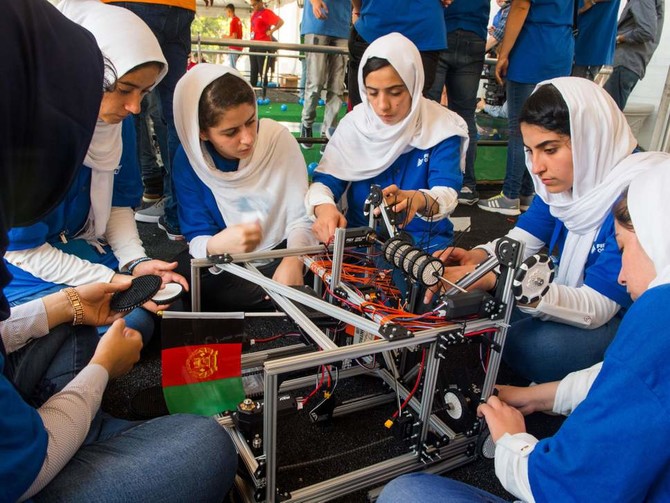There are now about 890 small and medium-sized, female-owned enterprises in different sectors across Afghanistan
Afghan female entrepreneurs are among the most resilient in the world since they work against multiple odds and challenges., says official
by SAYED SALAHUDDIN for Arab News November 25, 2018
photo: Members of the Afghan all-girls robotics team make adjustments to a team robot in the practice area on July 17, 2017. Afghan women are considered among the most resilient in the world since they work against multiple odds and challenges. (AFP/Getty Images/file)
KABUL: Naziya Basharmal, an Afghan female entrepreneur, set up a small tailoring facility at her home in Kandahar province, one of the most conservative parts of Afghanistan, with less than $800 in assets almost two years ago.
Since then, she has made more than $12,000 in profit, equivalent to at least two decades’ worth of income for the average civil servant in Afghanistan.
Encouraged by the income, she expanded her business and now has an army of 50 female tailors.
She sends the fabrics to their homes since many women who can forge world-famous embroidery cannot run their own shops due to cultural restrictions.
“You have to be confident when you take on this type of work. It looks tough at the beginning, but you’ll soon yield results,” Basharmal, who is in her mid-30s, told Arab News at the first National Women Entrepreneurs’ Summit in Kabul.
The summit named 12 prominent businesswomen to watch in 2018, and gave these entrepreneurs a platform to share their experiences and the challenges they face, in addition to exploring ways to facilitate trade for women in a male-dominated society that has suffered decades of war.
Several hundred women entrepreneurs, some covered head to toe, took part in the two-day summit.
They came from different parts of Afghanistan. Some had traveled miles on long road trips, others by airplane. Some even came with their toddlers.
One prominent businesswoman at the summit was Mohsina Saqeb, a former award winner who runs Jama-e-Saqeb (Jama), a handicraft production company founded a year ago in Kabul.
Jama produces modern handmade embroidery infused with traditional design mostly for women’s clothing lines. The company also makes bags and purses.
Like others who attended the summit, several businesses are now after her designs, which have garnered appeal among different generations regionally and as far as the US, according to officials at the Afghan Commerce Ministry.
“My profits have jumped 50 percent since opening Jama and introducing this collection. Essentially, we’re empowering women to contribute to economic growth,” said Saqeb.
“Female entrepreneurship is a new phenomenon in Afghanistan. These new opportunities have instilled many with a renewed sense of hope. You just have to take the initiative.”
Her designs will be on display at Dubai’s Global Village, a first for a female Afghan entrepreneur.
Zahra Nazari, a young and budding businesswoman from the central Bamiyan province who has run her own firm for more than 10 years, regularly exports her products to India, Turkey and Pakistan.
“Women entrepreneurs have managed to break the gender barrier here, and many now export to various parts of the world,” said Nazari. “There’s a good market for our services.”
Numerous products made or handled by women, including saffron, packaged dried fruit, carpeting, marble, handicrafts and jewelry, have garnered global interest.
According to local ministry estimates, there are about 890 small and medium-sized, female-owned enterprises in different sectors across Afghanistan.
The firms have reportedly created employment opportunities for almost 48,000 entrepreneurs in Afghanistan, most of them women.
The growing number of women getting involved in business prompted the ministry to set up a separate chamber of commerce for women last year, said ministry spokesman Musafir Kokandi.
“We aim to enable them to go from growth to growth,” said Kamila Sediqi, deputy minister of commerce and industry, adding that Afghan women are among the most resilient in the world since they work against multiple odds and challenges.
Women at the summit, nevertheless, voiced concern over numerous challenges, including high taxes, a lack of security and state-level corruption.



